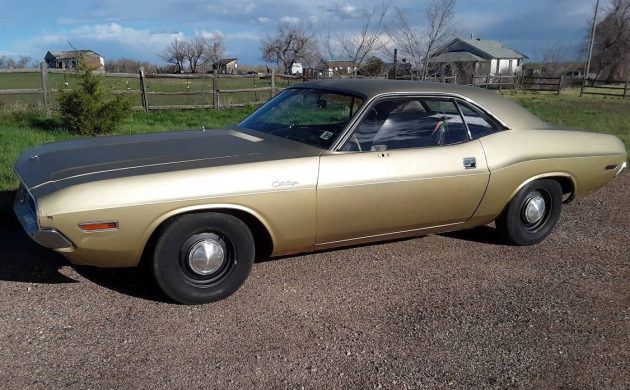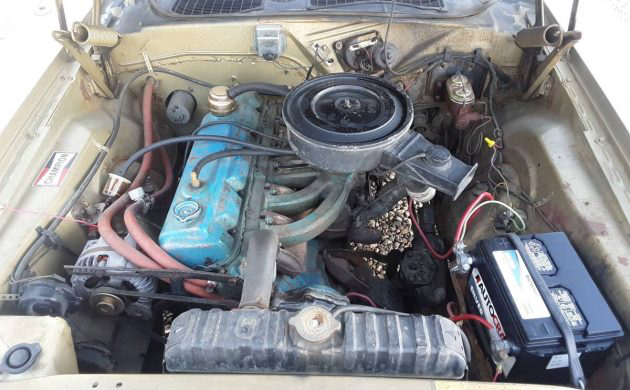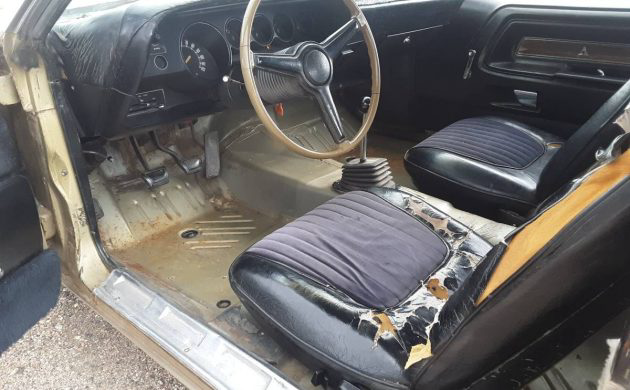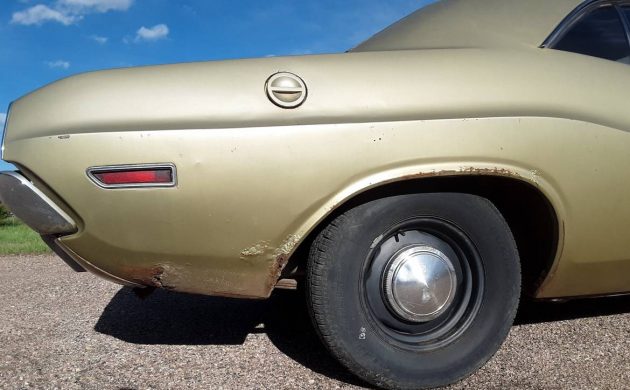Slant Six Survivor: 1970 Dodge Challenger
The cliche title, “Only the Strong Survive,” has been used in approximately fifty trillion articles about muscle cars written by reporters that know nothing about muscle cars. Enthusiasts know better. Muscle cars live hard lives and do not have a high survival rate. It is the base models that came with few options that tend to survive. The owners that worked the option sheet to save money knew the value of a dollar and took exceptional care of their new vehicle. After all, they did not intend to make another new car purchase any time soon, so they made sure to maintain and protect their investment. Our subject Challenger appears to be such a car. A base model with modest options, it appears to be an original car that was used but not abused. Find it here on craigslist where it is listed for $17,500 and located in Fort Collins, Colorado, with a small stash of parts. Thank’s to Gunter Kramer for pointing us to this survivor E-body.
This well-preserved first-year Challenger is powered by a 225 ci slant six connected to a three-speed manual transmission. The ad claims that the car has been off of the road since 1997, although it starts and drives but will need further attention to be roadworthy. The engine compartment appears mostly original with a tell-tale new battery. Evidence of past repairs is present in the wiring, the fuel system, and heater hoses, but the overall condition seems consistent with a single roll-over of the odometer. The fender tag is not present in the photos.
The interior is in good condition for its age and miles. The driver’s seat needs to be recovered. No photos show the condition of the rest of the seats or headliner. The dash looks to have some type of cover on top of the usual E-body issues and the radio is missing. The carpet has been removed to show the floors to be in good condition. The parts are readily available to restore the interior for show car duty or just to drive.
The body looks to be wearing its original light green paint. While far from rust-free, it is in good enough condition that it could be patched for a driver or serve as the basis for a full restoration. Rust has done the most damage to the trunk floor, rear quarter panels, and bottoms of the front fenders. A detailed inspection of these and other areas is called for. Overall, the car presents well and could be returned to service without extensive surgery.
This shabby little Challenger provides quite a conundrum for its next owner. It is nice enough to perform a sympathetic refurbishment and use it as a summer driver. It is original enough that it could be easily restored to a high standard without a lot of time-consuming parts chasing. Alternatively, it could easily be modified into a muscle car with options of a patina driver to a restomod to a factory recreation of any number of desirable models. Twenty years ago, cars like this were used as a source of assembly line parts for more desirable models without a second thought. Now that original cars are becoming rare, keeping a car like this original is not beyond reasonable. I’m rooting for the next owner to preserve it as much as possible.
Auctions Ending Soon
 1971 Ford Mustang Mach 1Bid Now23 hours$7,100
1971 Ford Mustang Mach 1Bid Now23 hours$7,100
 2003 Porsche Boxster SBid Now24 hours$5,500
2003 Porsche Boxster SBid Now24 hours$5,500
 1966 Lincoln ContinentalBid Now1 days$500
1966 Lincoln ContinentalBid Now1 days$500
 2000 Jaguar XJ8LBid Now4 days$1,250
2000 Jaguar XJ8LBid Now4 days$1,250
 1977 Datsun 280ZBid Now5 days$275
1977 Datsun 280ZBid Now5 days$275






Comments
17 large to buy / 17+ large to fix. That slant’ll disappear, and I’m not sure that makes me (usually) unhappy. Is must be the cheapest concoction of a 70 Challenger.
The six in one of these has to be rarer than a mild V8, you’d think anyone ponying up for a Challenger over a Dart or Duster would’ve likely gone for at least a single-barrel 318.
I would repair the rust and worn out items and leave the slant 6. Car shows have endless rows of V8s that really need to be special to stand out at all. Mopars with a well- detailed showroom-fresh Slant6 are much less commonplace nowadays.
And it goes without saying, keep the black steelies and poverty caps and wrap’em in white letter tires. This is America after all 😎🇺🇸
Keep the slant 6, dress it with factory Direct Connection hipo gear and let them all shake their heads in awe.
That ship sailed. They don’t offer slant six parts any longer.
Steve R
Clifford Performance will hook you up with everything that a six-popper lover needs. One thing a 225 has that will make you feel sporty are solid valve lifters that require occasional adjustment. I’ve done it, it’s really not hard if you follow the procedure and are patient.
I’d be willing to bet that a slant six with the right Hi Po gear could stay with a 318 easily. And it would be quite the conversation piece at a show.
What,,,no hemi? Run for the hills, Ma Barker,,,See, the thing is, the only reason all you see today is “hemi” this and “hemi” that, is because THESE were the cars most people drove, and rusted away accordingly. People, for the most part, kept high performance cars away from daily duty, and why you never see these today. Naturally, I’d leave it as is, maybe some nicer wheels, and a quick check on slanty parts, doesn’t seem like any shortage there. Great find on a car you could actually use. Challengers were really nice cars, except today, every one you see is a snarling, fire-breathing monster, totally unusable for the street. Here, you can drive a neat old Challenger, feed it the crap that’s sold as gas today, ( if you can find any, got a dilly of a pickle in the SE, I hear) and still get 20 mpg.
When I was working in South Carolina in 1997 I bought a 1968 Satellite with a 225 and drove it home to Pittsburgh when the project I was on was completed. It needed a valve adjustment and a carburetor. It would return 30 mpg while driving 70 mph, not bad for such a big car.
Our calibration shop had a Thomas one-Ohm standard that needed to go to NIST in Gaithersburg, MD once a year. It was made in 1964. They bugged me to drive it there in the Plymouth, so I had a nice day driving it there. The 225 had no problems flattening the hills on Interstate 68. Bottom line is, if you buy a car with a six changing the drivetrain should be last on the list. You just might enjoy the looks, waves, and long distances between gas stops. I made the trip to NIST on half a tank, and when I brought it home from Hartsville I made it to Wytheville on maybe half a tank. I miss that car!
Howard is right, this is how they were . Slant 6 challenger was fairly popular. Crazy thing is, these days this car is probably rarer then a hemi or 440. When they were new it was the other way around, you seldom saw a hemi.
Hopefully it will retain the slanty but I doubt it..
I hope whoever gets this doesn’t tear the six out to put in a bigger engine. It’s such a rarity, it needs to remain intact.
I saw a Plumb Crazy Challenger convertible with a 225 at a show a couple years ago.
LS/T56 swap it. lol
Save the six! Why ruin a real survivor, and an anomaly among Challengers. This car would be a treat to drive, and not everyone needs to be able to do burnouts or smokehouse to feel that they’re driving a “real car.” In its own way, it is a street sleeper. Keep it original!
the price is way to high its not a car any one wants there is nothing special about it maby 4500 tops
Hellcrate candidate..
If I’m not mistaken, in 1970 steel wheels were still body colored on MoPars having hub caps, and black on cars having full wheel covers; in ’71, steel wheels only came in black no matter the caps.
I had a 70 Challenger with exactly the same equipment, 225 with 3 speed. Mine was B5 Blue. Paid $250 for it in 1977 put in a clutch, drove it for 10 years after that. It’s what got me started on real Mopar fanaticism.
I would be to embarrassed to open the hood at a car show.
Wow , this one must have been the “cheap Challenger” they would put in newspaper ads to get people to the dealerships ! It doesn’t even have power steering , and it may not even have had a radio as the antenna mast looks aftermarket.
I’ve driven many mid 60s and up Mopars; still have two . Many people complain about “no feel” on Mopar power steering, but to me not having road feel when you steer is what power steering is about. Did a lot of crazy stuff with Mopars when I was a kid ; never had an issue with not knowing where the wheels were pointed.
I’m not seeing light green paint here ,it looks more like Gold Poly or maybe light Gold Poly
KISS. Keep it super simple. Restore while driving it. Keep all the original equipment , make it roadworthy and safe and you can brag that you got a 70 Challenger for cheap. Why ruin the originals when every car at the car shows has a V8 which isn’t very interesting lately. Be different.
(M)ostly (O)ld (P)arts (A)nd (R)ust …. Gonna need lots of NEW Metal.
Cheapest Challenger was called the Deputy. You can see ads for it online. So cheap that the rear windows were fixed closed. I’m sure they did not save much if any by doing this.
I remember those. Came with a standard 198 or 318, they had the gall to charge extra for a 225! Silly really, because it probably costs more to make extra tooling and line complication to make a “cheap” car then to just use the standard stuff. Why not just lower the price of the standard car? The 198 was a dumb idea, cost the same as the 225 to make, so why not just give your customer the better value? I really doubt there was any real world MPG differences. How much did they save not putting in two rear window cranks? Five bucks? The money guys can be so obnoxious sometimes. Same today though, how much they can over charge for some models, and not even offer standard lower priced options.
Actually, Curt, the 198 probably didn’t cost them a penny more than the 225 to produce, and actually cost less that it’s predecessor. One of the reasons that they dropped the 170 and introduced the 198 for 1970 was that the 198 shared the 225’s tall deck block and bore size, whereas the previous “small” six for the first ten years of the slant six’s life, the 170, shared only bore size, with everything else being unique.
As far as the retail cost, the sale price of engines has NEVER been tied to the cost of production. The standard has always been that bigger and/or more powerful versions of an engine family always sells for more than lesser versions.
It wouldn’t have been just window cranks , but the rear window regulators and door runs would have been eliminated ,and all the hardware. Not sure how many were made like that, but if you add up the money saved per car, it could have saved a lot.
Curt they still do stuff like that today. Also the Challenger door handles were different from Barracudas. The window switches curved in on the Barracuda and
out for the challenger. This kept the engineers employed.
I’d build the six, replace the three-speed manual with a four-speed and put in a limited-slip rear end with around a 3.55 gear. That would be fun on the street.